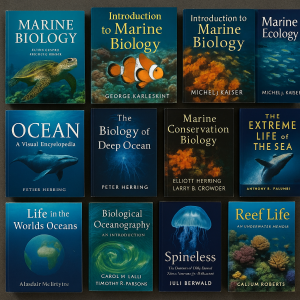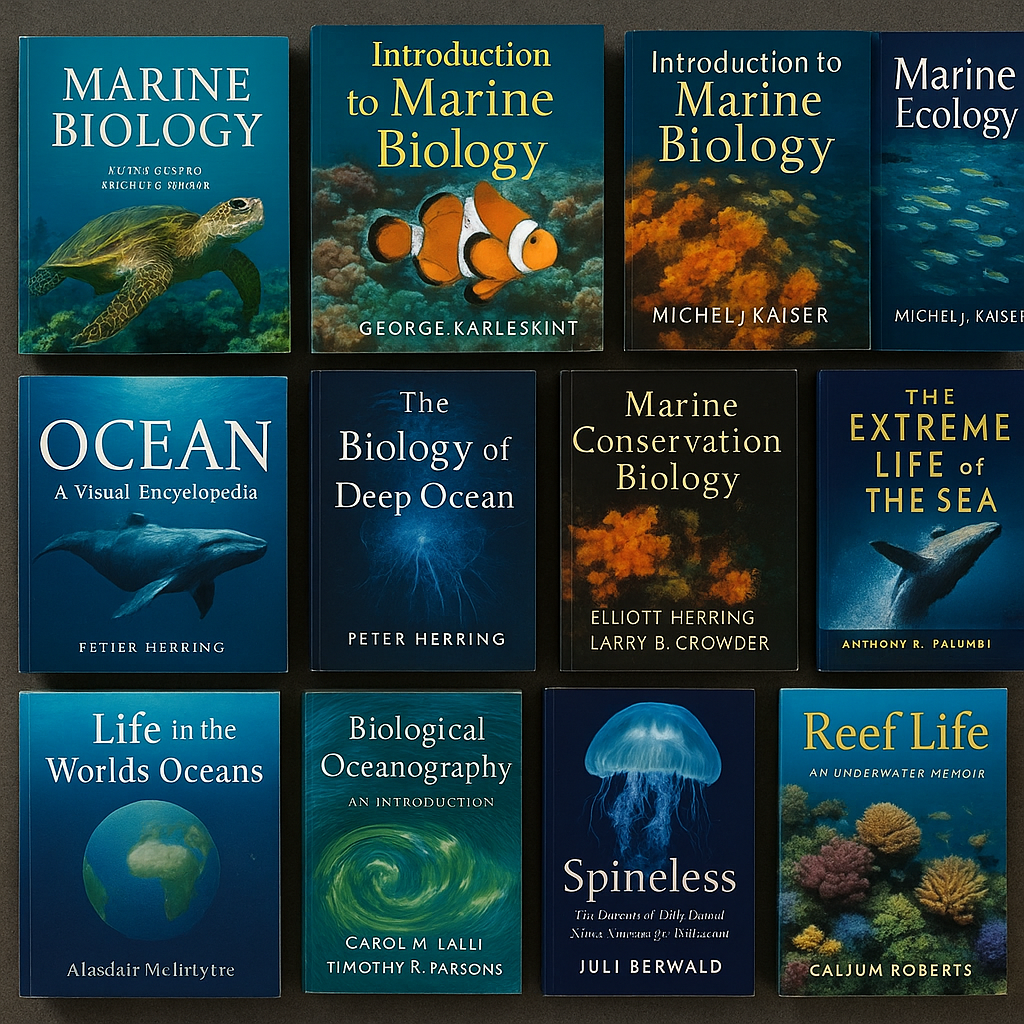Dive into the best marine biology books for maritime students, professionals, and enthusiasts. Discover top titles that explain ocean ecosystems, marine creatures, and human impacts—backed by science, storytelling, and real-world data.

Marine biology is the science of life in the sea. It touches everything from climate change to commercial fishing, coral reefs to marine mammals, and plankton to deep-sea ecosystems. For those in the maritime world, understanding marine biology isn’t just academic—it’s practical and essential.
Whether you’re studying to become a marine officer, conducting coastal research, working in marine conservation, or simply passionate about the ocean, the right books can deepen your knowledge and sharpen your insights.
This guide explores 12 of the most trusted, engaging, and widely respected books on marine biology. Some are written by leading scientists, others by gifted storytellers—but all offer a window into the wonders of ocean life.
Why Marine Biology Matters in Modern Maritime Operations
Marine biology influences many areas of maritime practice:
- Fisheries management depends on understanding spawning cycles, species migration, and ocean food webs.
- Environmental compliance requires knowledge of endangered species and habitats protected under conventions like MARPOL Annex V and the Convention on Biological Diversity (CBD).
- Ship routing and port activities are now evaluated for their environmental impact on sensitive marine zones, especially coral reef systems and nursery areas.
- Ballast water management, as regulated under the IMO BWM Convention, is directly tied to the spread of invasive marine species.
Organizations like the International Maritime Organization (IMO), the Intergovernmental Oceanographic Commission (IOC), and the European Maritime Safety Agency (EMSA) regularly publish reports stressing the need for marine biology literacy in maritime operations.
Top 12 Marine Biology Books
1. Marine Biology by Peter Castro and Michael E. Huber
A cornerstone textbook in marine science education, this book covers everything from ocean zones to marine mammals, with an accessible tone and excellent visuals.
- Best for: Maritime students, cadets, and marine educators.
2. The Biology of the Oceans by P.J. Hayward
This title provides a broader understanding of ocean ecosystems and biogeochemistry. It’s useful for both biology and environmental science learners.
- Best for: Port environmental officers, marine engineers interested in ecosystems.
3. Ocean: The Definitive Visual Guide by DK and Smithsonian Institution
Visually stunning, this encyclopedic guide covers marine life, ocean currents, and major oceanic phenomena.
- Best for: General readers, maritime enthusiasts, educators.
4. Marine Ecology: Processes, Systems, and Impacts by Michel J. Kaiser et al.
Focuses on ecological principles, human impacts, and conservation strategies.
- Best for: Environmental compliance managers, marine policy professionals.
5. The Sea Around Us by Rachel Carson
A poetic yet scientifically grounded classic that awakened public interest in ocean science.
- Best for: Readers interested in environmental history and marine storytelling.
6. Biological Oceanography: An Introduction by Carol Lalli and Timothy Parsons
More technical in scope, this book explores the dynamics of ocean productivity and nutrient cycling.
- Best for: Academic researchers, marine ecologists, oceanographers.
7. Life in the Oceans: The 20th Century and Beyond by Lucy Warner
Blends historical developments in marine biology with modern research trends, including genomics and robotics in underwater studies.
- Best for: Curious learners, students, educators.
8. The Extreme Life of the Sea by Stephen R. Palumbi and Anthony R. Palumbi
A lively exploration of how life thrives in harsh ocean environments—from deep-sea vents to the Arctic.
- Best for: High school readers, undergraduates, marine adventurers.
9. Marine Mammals: Evolutionary Biology by Annalisa Berta, James Sumich, and Kit Kovacs
Detailed coverage of whales, dolphins, seals, and manatees with a focus on biology, anatomy, and conservation.
- Best for: Marine mammal observers, research scientists, wildlife officers.
10. Marine Microbiology: Ecology & Applications by Colin Munn
An important title that focuses on microbial life in the oceans—crucial for understanding everything from climate regulation to oil spill cleanups.
- Best for: Marine researchers, environmental biologists, chemical engineers.
11. Coral Reefs in the Anthropocene edited by Charles Birkeland
Provides in-depth analysis of coral reefs under threat, including resilience strategies and restoration science.
- Best for: Port planners, coastal zone managers, marine conservationists.
12. Marine Conservation Biology: The Science of Maintaining the Sea’s Biodiversity edited by Elliott A. Norse and Larry B. Crowder
A comprehensive guide focused on preserving marine ecosystems amid overfishing, habitat loss, and pollution.
- Best for: Policy-makers, marine NGOs, coastal community advocates.
Real-World Applications in the Maritime Industry
Case Study 1: Coral Reef Protection in Port Development
Port expansions in Australia and the Maldives have required biological surveys of nearby reefs. Using methods found in Marine Ecology and Coral Reefs in the Anthropocene, environmental impact assessments guided dredging limits and reef restoration plans.
Case Study 2: Invasive Species Monitoring via Ballast Water
IMO’s Ballast Water Management Convention has led shipowners to use data and identification methods discussed in Marine Microbiology to detect invasive phytoplankton and bacteria species.
Case Study 3: Arctic Navigation and Mammal Safety
Shipping lanes in the Arctic must now consider migration routes of whales and seals. Guidance from Marine Mammals informs seasonal routing choices and speed regulations to reduce ship strikes.
Case Study 4: Aquaculture Site Planning
Books like The Biology of the Oceans and Biological Oceanography help site managers predict current flow, nutrient availability, and waste dispersion when planning offshore aquaculture farms.
Frequently Asked Questions
Which marine biology book is best for beginners?
Marine Biology by Castro and Huber is ideal—it offers clear explanations and vibrant illustrations.
Are these books useful for seafarers or ship officers?
Yes. Understanding marine life helps ship crews comply with environmental rules and avoid ecologically sensitive zones.
Is marine biology relevant to shipping companies?
Absolutely. Ballast water, emissions, route planning, and even port licensing now depend on marine biodiversity knowledge.
Do any of these books include climate change content?
Yes. Marine Ecology, Coral Reefs in the Anthropocene, and Marine Conservation Biology directly address climate change impacts on the sea.
Can non-native English speakers understand these texts?
Many titles are written clearly with glossaries and diagrams. Some editions may also be available in other languages.
Where can I find these books?
They’re available through academic libraries, online platforms like Amazon or Springer, or maritime institutions like the IMarEST library.
Conclusion
The sea is a living, breathing system—and marine biology is the language it speaks. For maritime professionals, students, and ocean enthusiasts, learning this language is no longer optional. It’s a key to environmental responsibility, operational success, and future-ready leadership.
These 12 books span the full scope of marine life science—from microbes to whales, from coastal ecology to open ocean dynamics. Whether you’re preparing an environmental impact report, developing a port master plan, or simply curious about the mysteries of the sea, one or more of these titles will serve you well.
Knowledge is power—and when it comes to the ocean, it’s also protection.
References
- IMO. (2023). Ballast Water Management and Biodiversity. https://www.imo.org
- EMSA. (2022). Environmental Compliance in European Ports. https://emsa.europa.eu
- Castro, P., & Huber, M. E. (2019). Marine Biology. McGraw-Hill.
- Kaiser, M. J., et al. (2011). Marine Ecology: Processes, Systems, and Impacts. Oxford University Press.
- Lalli, C., & Parsons, T. (1997). Biological Oceanography. Elsevier.
- Carson, R. (1951). The Sea Around Us. Oxford University Press.
- Berta, A., Sumich, J., & Kovacs, K. (2015). Marine Mammals. Academic Press.
- Munn, C. (2020). Marine Microbiology. Elsevier.
- Birkeland, C. (2015). Coral Reefs in the Anthropocene. Springer.
- Norse, E. A., & Crowder, L. B. (2005). Marine Conservation Biology. Island Press.
- DK Publishing & Smithsonian Institution. (2011). Ocean: The Definitive Visual Guide. Dorling Kindersley.
- Hayward, P. J. (1996). The Biology of the Oceans. Oxford University Press.
- Warner, L. (2020). Life in the Oceans. Routledge.

